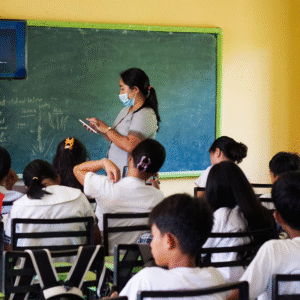16-year-old Samantha highlights the importance of comprehensive sexuality education amid an emerging HIV epidemic

Sex education is not widely available in the Philippines, largely due to the influence of the Catholic Church.
Picture by: Anna Ow | Alamy
Article link copied.
October 3, 2025
Why sex education is essential, especially in the Philippines

Much of what teenagers learn about sex comes from the internet, which is often riddled with inaccurate information and myths. Those without proper sex education are especially susceptible to harmful misconceptions.
The lack of comprehensive sex education among young people contributes to the rising cases of sexually transmitted infections (STIs), including HIV (the virus that attacks the immune system and progresses to AIDS when not treated).
Harbingers’ Weekly Brief
This is a particular problem in the Philippines where sex education is not widely available and where there is an HIV epidemic, according to the World Health Organization and the United Nations.
Within the Asia-Pacific area, the Philippines has the quickest-growing HIV rate. This year, every day at least 57 Filipinos have discovered they have HIV. Between 2010 and 2025, the number of HIV cases increased by 550%, going from 4,400 to 29,600. In 2025, more than 250,000 Filipinos are estimated to be living with HIV.
Promoting an abstinence-only education is not enough. There is insufficient evidence that it curbs sexual activity among youth, and it neglects the needs of sexually active young people.
More critically, it deprives young people of essential knowledge about informed consent, leaving them vulnerable to sexual abuse. There is an urgent need for a comprehensive and evidence-based approach that includes information on the utility of contraceptives to prevent teenage pregnancies and STIs.
What is CSE?
Comprehensive sexuality education (CSE) is taught in many countries, and usually includes topics on human sexuality, informed consent, effective contraceptive use, HIV/AIDS and other sexually transmitted infections, sexual violence, etc.
CSE aims to help young people recognise, question and break harmful stereotypes that persist in society. By providing evidence-based information, it empowers them to make informed decisions about their bodies and sexual relationships.
CSE promotes appreciation of gender and sexual diversity, reducing homophobia. It goes beyond just the mechanics of sex, allowing teens to develop a healthy attitude towards sex.
Students also gain further understanding on how STIs are transmitted and how they can be prevented. They also learn the importance of effective contraceptive use, reducing the risks of unplanned pregnancies and STIs.
Why is CSE problematic in the Philippines?
Although the Responsible Parenthood and Reproductive Health Act of 2012 mandates sex education in the curriculum, CSE has not been implemented in all schools, largely due to the influence of the Catholic Church and its hold on conservative Filipino values. For example, some private Catholic schools don’t teach CSE, believing it “encourages” sexual activity.
In 2023, Senator Risa Hontiveros introduced the Adolescent Pregnancy Prevention Bill (also known as Senate Bill 1979), which introduces “age and development-appropriate” CSE to the school curriculum, guided by the Department of Education and international standards.
However, some conservative politicians opposed the bill, labelling it ‘woke’. In January, senator Joel Villanueva, along with faith-based group National Coalition for the Family and the Constitution, publicly rejected the bill. Former chief justice Maria Lourdes Sereno, who leads the group, voiced concerns that the proposed curriculum aligns too closely with “Western” and “liberal” standards of sexuality.
President Ferdinand ‘BongBong’ Marcos Jr. also expressed disapproval of the bill, describing it as an “abhorrent” idea.
“You will teach four-year-olds how to masturbate. That every child has the right to try different sexualities. This is ridiculous,” Marcos said. “If this bill is passed in that form, I guarantee all parents, teachers and children: I will immediately veto it.”
Following the criticism, seven senators withdrew their support from the bill. On 22 January, Hontiveros filed a substitute bill, removing the portion that stated that CSE will be guided by international standards. Instead, it will follow a “culture-based” approach, one that values parental authority and religious freedom. (The bill is still with the Senate.)
Much of the conservatism surrounding contentious topics in the Philippines come from the influence of the Catholic Church, which has also prevented authorities from legalising divorce, abortion and same-sex marriage.
Breaking HIV-related stigma
In an era where online misinformation is widespread, evidence-based sex education is vital in protecting and preparing the next generation for the realities of sexual health and well-being. This also highlights the need to debunk several misconceptions and myths.
Well-known Filipino actor Adrian Lindayag, who is open about his own HIV diagnosis, spoke with Harbingers’ Magazine on common myths people tend to believe about HIV/AIDS that he has always wanted to debunk.
“Most Filipinos are not aware that HIV isn’t a terminal illness, that medication and testing are completely free, that the medication allows people living with HIV to live a healthy life,” he said, dismissing the misconception that HIV cannot be treated.
“Also,a lot of Filipinos are not aware of the different modes of transmission of HIV.”
Misconceptions surrounding HIV/AIDS often prevent individuals from seeking early diagnosis and proper intervention,which can lead to more severe health complications and continued spread of infections. Lindayag addresses the need to counter harmful misconceptions through education and awareness campaigns.
“Fear and stigma comes from lack of knowledge, and I say that from experience. I wish that instead of instilling fear in young people, we should educate them about the different modes of transmission of HIV, how the virus works in the body, how they can protect themselves, which clinics they can visit for free testing, and what organisations they can follow on social media to access information,” he continued.
Help is available. The AIDS Society of the Philippines provides prevention strategies to reduce the spread of HIV/AIDS and support strategies to help those living with the condition.
By integrating CSE into school curriculums, we can create a society free of judgement where people with HIV/AIDS can open up about their experiences.
Written by:

The Harbinger Prize 2024 (International Affairs)
Writer
Cavite, Philippines
Born in 2009 in Cavite, Philippines, Samantha now studies in Manila. She is interested in literary and performance arts and plans to study medical anthropology. She joined the magazine having won the International Affairs category of the Harbinger Prize 2024.
After successfully completing the Essential Journalism course, Samantha became a writer for Harbingers’ Magazine starting in March 2025.
In her free time, Samantha enjoys writing proses and poetries. She won Notable Submission Award in 2021 Bow Seat Ocean Awareness Contest Poetry & Spoken Word Junior Category and is one of the runner-ups in the 2022 Immerse Education Essay Competition.
Samantha speaks Filipino and English.
Edited by:

🌍 Join the World's Youngest Newsroom—Create a Free Account
Sign up to save your favourite articles, get personalised recommendations, and stay informed about stories that Gen Z worldwide actually care about. Plus, subscribe to our newsletter for the latest stories delivered straight to your inbox. 📲
© 2025 The Oxford School for the Future of Journalism


